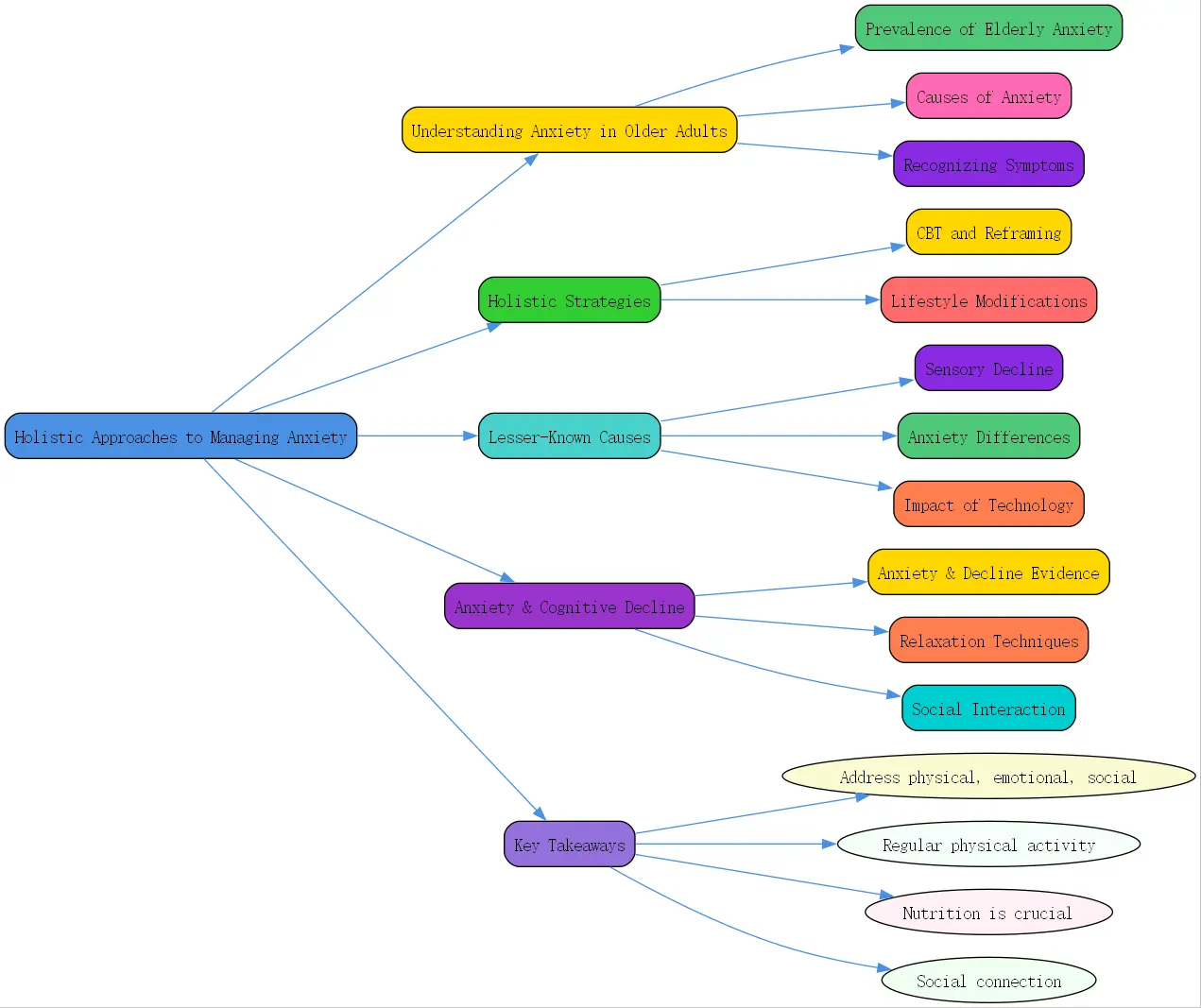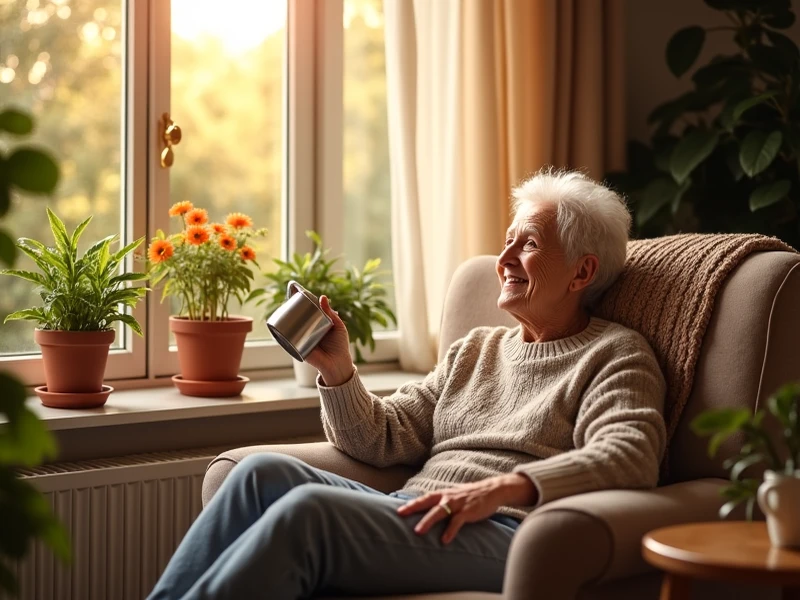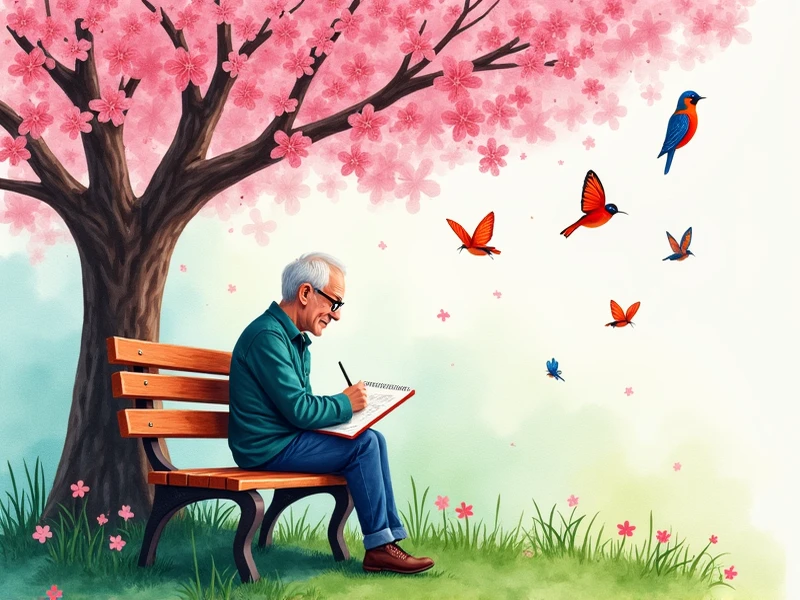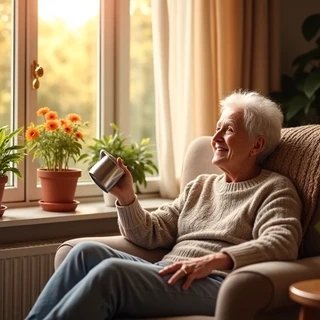Understanding Anxiety in Older Adults

Anxiety is a complex emotional state that affects people of all ages, but its impact on older adults can be particularly profound. Despite being one of the most common psychological challenges faced by seniors, anxiety often goes unrecognized or is mistakenly attributed to other conditions. This oversight can significantly impact an older adult’s mental well-being and overall quality of life.
Prevalence and Overlooked Nature of Elderly Anxiety
Anxiety disorders, including generalized anxiety disorder, panic disorder, and social anxiety disorder, are surprisingly prevalent among the elderly population. However, due to stigma and a general lack of awareness, many seniors do not seek help for their symptoms. Instead, they may internalize their worries or attribute their distress to the natural aging process, leading to prolonged suffering that could otherwise be addressed with proper intervention.
“”At BrainTalking, we’ve observed that anxiety in older adults is frequently misinterpreted as simply part of getting older,”” says Dr. Emma Richardson, senior psychologist. “”This misconception prevents many seniors from receiving the support they truly need.””
Causes of Anxiety in Old Age: A Multifaceted Issue
Life Changes: Retirement, Loss, and Dependence
As individuals age, they often face numerous life changes that can trigger anxiety. Retirement, which is often anticipated as a time of relaxation, can sometimes lead to feelings of purposelessness and financial insecurity. The loss of loved ones becomes increasingly common, creating grief that can transform into persistent anxiety. Additionally, the gradual loss of independence and increased reliance on others can generate significant stress and worry for many seniors.
Declining Health and Chronic Illnesses
Declining physical health represents another significant contributor to anxiety in older adults. Chronic conditions such as heart disease, arthritis, and diabetes can create persistent worry about one’s well-being and ability to manage daily activities. Cognitive decline, including conditions like dementia and mild cognitive impairment, can further exacerbate feelings of confusion and anxiety, creating a cycle that impacts both mental and physical health.
Social Isolation and Loneliness
Many older adults experience a shrinking social circle due to the loss of friends and family members, relocation, or mobility issues. This social isolation can lead to increased anxiety as individuals may feel unsupported or disconnected from the world around them. Furthermore, the fear of becoming a burden to loved ones can create ongoing stress and apprehension that compounds existing anxiety.
Recognizing Anxiety Symptoms in Seniors
Identifying anxiety in older adults presents unique challenges, as symptoms often manifest differently than in younger individuals. Rather than articulating feelings of anxiety directly, seniors may present with physical complaints like fatigue, muscle tension, headaches, and digestive issues. Sleep disturbances, including difficulty falling or staying asleep, are also common indicators.
Behavioral changes can signal anxiety as well, including increased irritability, restlessness, avoidance of social activities, and excessive worry about minor concerns. Some seniors may become overly dependent on family members for reassurance, while others might withdraw entirely from social interactions. These varied presentations make it essential for caregivers and healthcare providers to remain vigilant about potential anxiety symptoms.
Holistic Strategies for Managing Anxiety
Effectively addressing anxiety in older adults requires a comprehensive approach that considers both psychological and physical aspects of well-being. Holistic approaches to managing anxiety can provide substantial relief while enhancing overall quality of life.
Cognitive Behavioral Therapy (CBT) and Reframing Negative Thoughts
Cognitive behavioral therapy has proven highly effective in reducing anxiety symptoms among older adults. This therapeutic approach helps individuals identify negative thought patterns and replace them with more balanced perspectives. For seniors experiencing anxiety, CBT can provide practical tools for managing worry, catastrophic thinking, and fear.
“”CBT works particularly well for older adults because it’s structured, practical, and focuses on present concerns rather than deep historical analysis,”” explains Dr. Michael Zhang of BrainTalking. “”We’ve seen remarkable improvements in anxiety levels when seniors learn to challenge and reframe anxious thoughts.””
Lifestyle Modifications: Diet, Exercise, and Social Engagement
Regular Physical Activity: Walking, Yoga, Tai Chi
Physical activity represents one of the most effective holistic approaches to managing anxiety in seniors. Regular exercise such as walking, swimming, or gentle strength training promotes the release of endorphins, the body’s natural mood elevators. Mind-body practices like yoga and tai chi combine physical movement with mindfulness, making them particularly beneficial for anxiety management in older adults.
Even brief periods of movement throughout the day can significantly reduce anxiety symptoms. For seniors with mobility limitations, chair exercises or adapted movements can provide similar benefits while accommodating physical constraints.
Balanced Diet for Brain Health and Emotional Stability
Nutrition plays a critical role in managing anxiety. Foods rich in omega-3 fatty acids, such as fatty fish, walnuts, and flaxseeds, support brain health and may help regulate mood. Magnesium-rich foods like leafy greens, nuts, and whole grains have been shown to reduce anxiety symptoms by calming the nervous system.

Conversely, certain substances can exacerbate anxiety symptoms. Limiting caffeine, alcohol, and processed sugars can prevent the energy crashes and mood fluctuations that often trigger or worsen anxiety. Staying well-hydrated is equally important, as even mild dehydration can increase stress and anxiety levels.
Social Activities and Hobbies
Engagement in meaningful social activities and hobbies provides powerful protection against anxiety. Regular participation in community groups, religious organizations, or special interest clubs helps combat isolation while providing purpose and joy. Creative pursuits like painting, music, gardening, or crafting can serve as natural anxiety relievers by promoting mindfulness and flow states.
The Role of Family and Caregivers in Anxiety Management
Open Communication and Emotional Support
Family members and caregivers play a crucial role in helping older adults manage anxiety. Creating space for seniors to express their concerns without judgment or dismissal validates their experiences and reduces feelings of isolation. Active listening閳ユ敄ruly hearing and acknowledging an older adult’s worries閳ユ攦an itself be therapeutic.
Structured Daily Routine and Predictability
Establishing consistent routines helps reduce anxiety by creating a sense of order and predictability. Regular meal times, exercise periods, social engagements, and sleep schedules provide structure that can be comforting for anxious seniors. While flexibility remains important, a general framework for daily activities can significantly reduce stress.
Seeking Professional Help When Necessary
While support from family is invaluable, recognizing when professional intervention is needed represents an essential component of anxiety management. Signs that professional help may be necessary include anxiety that interferes with daily functioning, worsening symptoms despite support efforts, or the presence of suicidal thoughts.
Lesser-Known Causes and Specific Considerations for Elderly Anxiety
Uncommon Triggers of Anxiety: Sensory Decline and Life Transitions
Several lesser-known factors can trigger anxiety in older adults. Sensory changes, particularly declining vision and hearing, can create significant anxiety as seniors struggle to process their environment accurately. Major life transitions such as moving to assisted living facilities or downsizing longtime homes can provoke intense anxiety, even when these changes are objectively positive.
Past traumas may also resurface as individuals age, triggering anxiety symptoms that might seem disconnected from current circumstances. Understanding these less obvious triggers can help caregivers and healthcare providers develop more effective intervention strategies.
How Elderly Anxiety Differs from Anxiety in Younger Adults
Anxiety in older adults often presents differently than in younger individuals. While younger people may experience more classic panic symptoms, seniors frequently report physical complaints or general worries rather than identifying their condition as anxiety. Older adults are also more likely to attribute anxiety symptoms to physical health problems, potentially delaying appropriate treatment.
Additionally, anxiety in seniors often coexists with physical health conditions, creating complex symptom presentations that require careful assessment. This interplay between physical and mental health makes a holistic approach particularly valuable for older adults experiencing anxiety.

The Impact of Technology on Anxiety in Older Adults
Technology presents both challenges and opportunities for anxiety management in seniors. Learning to navigate new devices and digital platforms can create stress and frustration for those who didn’t grow up with such technologies. However, when properly introduced and supported, technology can also provide valuable anxiety management tools, including relaxation apps, virtual connections with loved ones, and access to telehealth services.
Long-Tail Keywords: Specific Anxiety Management Tips
Tips to Manage Anxiety and Stress Through Diet and Nutrition
Omega-3 Fatty Acids and Brain Health
Research increasingly supports the connection between omega-3 fatty acids and reduced anxiety symptoms. These essential fats, found in fish like salmon and sardines, as well as in plant sources like flaxseeds and walnuts, help maintain healthy brain function and may regulate neurotransmitters involved in mood regulation. For seniors who don’t regularly consume these foods, omega-3 supplements might be recommended after consultation with healthcare providers.
Magnesium-Rich Foods and Nervous System Calming
Magnesium deficiency has been linked to increased anxiety and stress responses. Incorporating magnesium-rich foods such as spinach, almonds, avocados, and dark chocolate can help maintain healthy magnesium levels and support nervous system function. These foods can be easily incorporated into most dietary patterns and provide additional nutritional benefits beyond anxiety management.
Avoiding Caffeine and Processed Sugars
Stimulants like caffeine can mimic and exacerbate anxiety symptoms, particularly in sensitive individuals. Similarly, processed sugars can cause blood sugar fluctuations that trigger anxiety-like sensations. Gradually reducing intake of these substances often leads to improved anxiety management, better sleep quality, and more stable energy levels throughout the day.
How to Manage ADHD Anxiety in Older Adults
While attention-deficit/hyperactivity disorder (ADHD) is often considered a childhood condition, many adults閳ユ攰ncluding seniors閳ユ攳ive with undiagnosed or newly diagnosed ADHD. The combination of ADHD and anxiety creates unique challenges that benefit from specialized approaches.
For older adults managing both conditions, structured environments with minimal distractions can help reduce anxiety triggers. Breaking tasks into smaller, manageable steps prevents overwhelming feelings that can trigger anxiety. Medication options should be carefully evaluated, as seniors may respond differently to standard treatments due to age-related changes in metabolism and potential interactions with other medications.
Managing Workplace Anxiety: Considerations for Seniors Still Employed
Many adults continue working well into their senior years, whether by choice or necessity. Workplace anxiety among older adults often stems from concerns about keeping up with technological changes, age discrimination, or health limitations affecting performance. Addressing these concerns requires both practical strategies and psychological support.
Clear communication with supervisors about reasonable accommodations can alleviate performance-related anxiety. Mentorship relationships閳ユ攨ither receiving guidance from younger colleagues about new technologies or providing mentorship in areas of expertise閳ユ攦an build confidence and reduce anxiety about workplace relevance. Practicing stress-reduction techniques before challenging workplace situations can also help manage anxiety symptoms in professional settings.
The Connection Between Anxiety and Cognitive Decline
Can Anxiety Contribute to Cognitive Decline? The Evidence
Growing evidence suggests a bidirectional relationship between anxiety and cognitive function in older adults. Chronic anxiety appears to accelerate cognitive decline through several mechanisms, including chronic elevation of stress hormones that may damage brain regions involved in memory and executive function. Additionally, anxiety often disrupts sleep, which is essential for cognitive restoration and memory consolidation.
Research indicates that untreated anxiety may increase the risk of developing mild cognitive impairment and potentially accelerate progression to dementia in vulnerable individuals. This connection underscores the importance of addressing anxiety as part of overall brain health maintenance in older adults.
Relaxation Techniques for Older Adults with Anxiety
Progressive Muscle Relaxation
Progressive muscle relaxation involves systematically tensing and then releasing different muscle groups, promoting awareness of the difference between tension and relaxation. This technique can be particularly effective for older adults who experience physical manifestations of anxiety, such as muscle tension and restlessness. It can be performed while seated or lying down, making it accessible for seniors with mobility limitations.
Guided Imagery
Guided imagery utilizes the power of imagination to create calming mental experiences. For seniors experiencing anxiety, visualizing peaceful settings or successful outcomes can provide temporary relief from worry and help interrupt anxiety cycles. This technique can be especially valuable for older adults who find themselves caught in repetitive anxious thoughts.
Breathing Exercises
Simple breathing exercises represent some of the most accessible holistic approaches to managing anxiety. Techniques such as diaphragmatic breathing, where individuals focus on slow, deep breaths that expand the diaphragm rather than shallow chest breathing, help activate the parasympathetic nervous system’s calming response. These exercises can be practiced anywhere and require no special equipment, making them ideal for immediate anxiety management.
The Important Role of Social Interaction in Reducing Anxiety
Social connection stands as one of the most powerful protections against anxiety in older adults. Regular, meaningful interactions with others help combat isolation, provide emotional support, and create opportunities for joy and laughter閳ユ攣ll natural anxiety relievers. Even brief social exchanges can significantly improve mood and reduce anxiety symptoms in seniors.
Community involvement, whether through volunteer work, religious organizations, or interest-based groups, offers structured opportunities for social engagement while providing a sense of purpose that counters anxiety. For those with mobility limitations, technology-facilitated connections, including video calls with family or online community groups, can provide similar benefits.
Key Takeaways for Holistic Anxiety Management in Older Adults
- Anxiety in seniors often presents differently than in younger adults and may be mistaken for physical ailments
- Holistic approaches to managing anxiety should address physical, emotional, and social dimensions of well-being
- Regular physical activity, particularly mind-body practices like yoga and tai chi, can significantly reduce anxiety symptoms
- Nutrition plays a crucial role in anxiety management, with particular benefits from omega-3 fatty acids and magnesium-rich foods
- Social connection represents one of the most powerful protections against anxiety in older adults
- Relaxation techniques including progressive muscle relaxation, guided imagery, and breathing exercises provide accessible anxiety management tools
- Professional support through therapy approaches like CBT offers effective treatment for persistent anxiety
- Addressing anxiety in seniors is essential not only for emotional well-being but also for preserving cognitive function
FAQ: Common Questions About Elderly Anxiety

Q: How can I tell if my aging parent is experiencing anxiety or something else?




